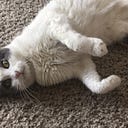Member-only story
When “Quiet” Becomes Your Identity
“This is the quiet one.”
They were always talking about me, of course. My childhood consisted of a string of introductions in which I was always “the quiet one.”
At times, “quiet” gave me a sense of pride. I was well-behaved. I never got yelled at and was rarely physically disciplined. I was good, and that fueled me.
“Quiet” was an identity that allowed me to gain favor with adults. “Quiet” allowed me to manipulate situations so I could avoid getting into trouble.
“Quiet” was also an adjective that did a lot of damage as I grew into adulthood, because “quiet” turned into “compliant” and “not expressive.” When I moved out of my mom’s house at 14, I had to learn to make decisions. I had to learn how to express opinions without fear of repercussions. I had to learn that not all adults were authority figures. I had to learn that not everybody deserves what I’d been taught was respect.
“Quiet” was a coping mechanism that became a detriment to my well-being. “Quiet” does not serve me well anymore, even though it once did. Instead, I was just anxious and agreeable. I worried nobody would like me once I opened my mouth, whether I had an idea for a class project or wanted to eat something specific for dinner. Ultimately, I thought it was easier to say nothing.
